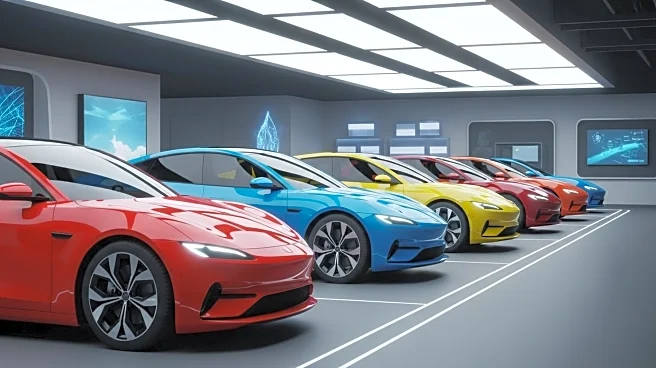What's Happening?
A recent analysis of the U.S. electric vehicle market has identified seven of the best deals available, emphasizing affordability and value for money. The Chevy Bolt, priced at $28,595, is noted for its reliability and popularity among owners. The Nissan LEAF, at $29,990, offers a subcompact crossover SUV format, appealing to those seeking a higher seating position. The Chevy Equinox EV, priced at $33,600, provides more space for families, while the Ford Mustang Mach-E, at $37,995, combines style and performance. The Tesla Model Y, available for $39,990, remains a strong contender despite mixed opinions about its brand. The Hyundai IONIQ 5 and Kia EV6, priced at $42,600 and $42,900 respectively, offer futuristic designs and spacious interiors.
Why It's Important?
The availability of affordable electric vehicles is crucial for increasing consumer adoption and transitioning towards sustainable transportation. These deals demonstrate that EVs can be competitive with traditional gasoline vehicles in terms of price, potentially accelerating the shift to electric mobility. As more consumers opt for EVs, the demand for charging infrastructure and related services is likely to grow, driving further investment in the sector. Additionally, the presence of diverse options in the market caters to varying consumer preferences, from compact models to larger SUVs, enhancing the appeal of EVs to a broader audience.
What's Next?
As the market for electric vehicles continues to expand, manufacturers may focus on enhancing features and reducing costs to maintain competitiveness. This could involve technological advancements in battery efficiency and charging speed, as well as strategic partnerships to improve infrastructure. Policymakers might also consider additional incentives to support EV adoption, such as tax credits or subsidies. Consumer education and awareness campaigns could play a role in highlighting the benefits of electric vehicles, further driving market growth.
Beyond the Headlines
The shift towards electric vehicles has broader implications for environmental sustainability, as reduced emissions contribute to climate change mitigation efforts. There may also be cultural shifts in consumer attitudes towards vehicle ownership, with increased interest in eco-friendly options. Long-term, the transition to electric mobility could influence urban planning and transportation policies, as cities adapt to accommodate new technologies and infrastructure needs.









